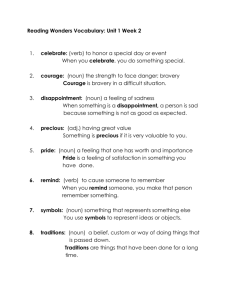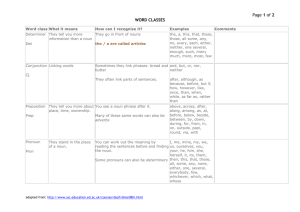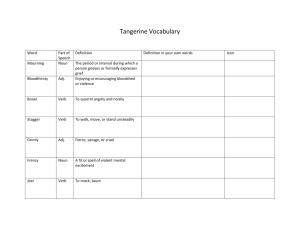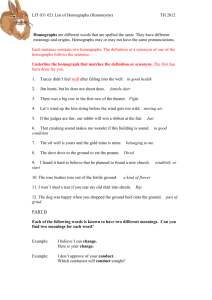File
advertisement
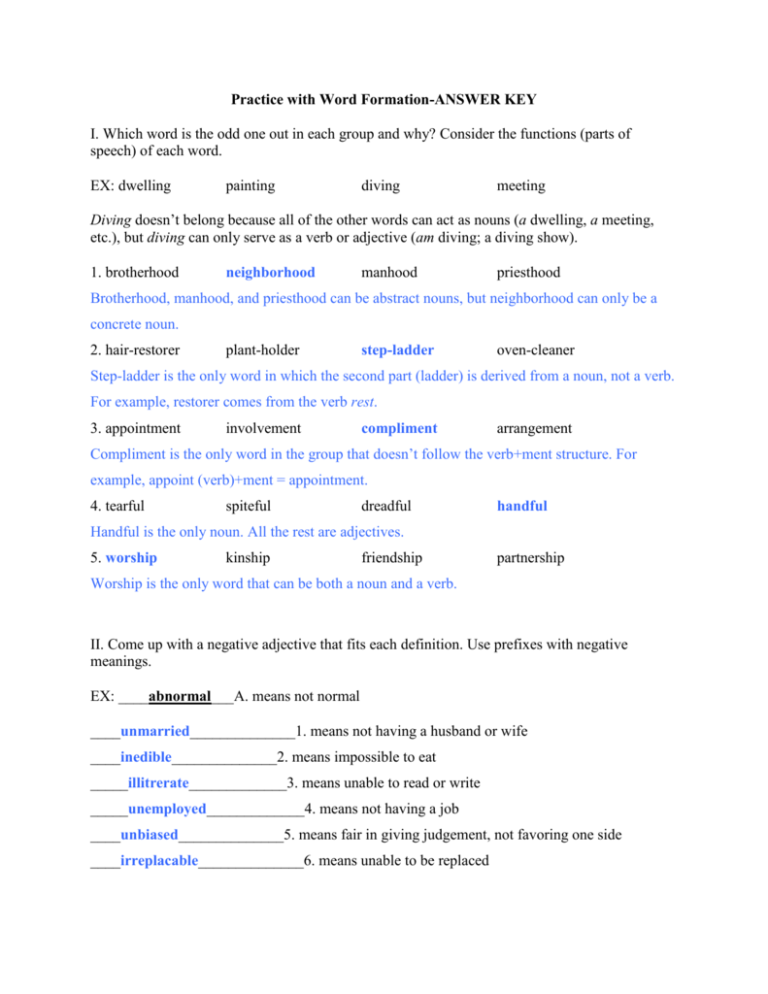
Practice with Word Formation-ANSWER KEY I. Which word is the odd one out in each group and why? Consider the functions (parts of speech) of each word. EX: dwelling painting diving meeting Diving doesn’t belong because all of the other words can act as nouns (a dwelling, a meeting, etc.), but diving can only serve as a verb or adjective (am diving; a diving show). 1. brotherhood neighborhood manhood priesthood Brotherhood, manhood, and priesthood can be abstract nouns, but neighborhood can only be a concrete noun. 2. hair-restorer plant-holder step-ladder oven-cleaner Step-ladder is the only word in which the second part (ladder) is derived from a noun, not a verb. For example, restorer comes from the verb rest. 3. appointment involvement compliment arrangement Compliment is the only word in the group that doesn’t follow the verb+ment structure. For example, appoint (verb)+ment = appointment. 4. tearful spiteful dreadful handful Handful is the only noun. All the rest are adjectives. 5. worship kinship friendship partnership Worship is the only word that can be both a noun and a verb. II. Come up with a negative adjective that fits each definition. Use prefixes with negative meanings. EX: ____abnormal___A. means not normal ____unmarried______________1. means not having a husband or wife ____inedible______________2. means impossible to eat _____illitrerate_____________3. means unable to read or write _____unemployed_____________4. means not having a job ____unbiased______________5. means fair in giving judgement, not favoring one side ____irreplacable______________6. means unable to be replaced III. Construct words/phrases to replace the underlined words, then rewrite the sentences so that they make sense with the new word/phrase. Focus on prefixes. EX: The doctor tried to come up with a medicine that would work against the negative effects of the poison. The doctor tried to come up with an antidote. 1. The BBC tries to avoid pronouncing foreign words incorrectly. The BBC tries to avoid mispronouncing foreign words. 2. Most people say they have to work too hard but are paid too little. Most people say they are overworked and underpaid. 3. He dated his check with a date that was later than the real date. He post-dated his check. 4. She’s still on good terms with the man who used to be her husband. She’s still on good terms with her ex-husband. 5. He made so many mistakes in the letter that he had to write it again. He made so many mistakes in the letter that he had to rewrite it. IV. Explain the difference between these pairs of words. 1. outlook – countable, abstract noun / look-out – countable, concrete noun (a person) 2. set-up – countable noun / upset – adjective of emotion 3. outlet – can be a concrete noun (wall outlet) or an abstract noun (emotional outlet) / let-out – abstract noun that means a chance to escape 4. outlay – uncountable noun that means the amount of money spent / layout – countable noun that means a plan or arrangement 5. walk-out – countable noun that means a protest / out-walk – countable noun that means a structure leading off from the main path Homophones, Homographs, and Homonyms I. Find the pair of homographs, homophones, or homonyms in each sentence. Explain the difference in meaning between the two words. 1. He’s a lead (head, main) singer in the group “Lead (type of metal) Piping.” HOMOGRAPHS 2. What a row (fight) from the last house in the row (line)! HOMOGRAPHS 3. It’s not fine (ok, alright) for you to fine (to charge) me for such a stupid thing. HOMOGRAPHS 4. I wish I could record (to make a CD) a hit record (an album)! HOMONYMS 5. Is it frequent (often, customary) for you to frequent (to come often) that club? HOMONYMS 6. There are holes (spots) in the whole (entire) ceiling. HOMOPHONES 7. Where (adverb of place) can I wear (to dress) that dress? It’s too elegant. HOMOPHONES 8. I have the right (privilege) to write (to scribe) my opinions. HOMOPHONES 9. He died when a chest (case, box) fell/pressed down on his chest (part of the body). HOMOGRAPHS 10. Do you mean (to signify) that I am a mean (insensitive) person? HOMOGRAPHS II. Homophones and homographs are at the root of many jokes in English. Match the first part of each of these children’s jokes with the second part and explain the play on words. __C__1. What did the big chimney say to the little chimney? A. a nervous wreck (a wreck as in a destroyed ship; a wreck as in a nervous person) B. I think I’m coming down with something (to get sick; to move downwards) __B_2. What did the lift say to the other lift? C. You’re too young to smoke (to smoke as in let off smoke from a fire; to smoke a cigarette) __E__3. Why did the man take a pencil to bed? D. Because it’s full of dates (dates the fruit; dates the important days in history) __D__4. Why is history the sweetest lesson? E. He wanted to draw the curtains (draw as in design; draw as in pull together) __A__5. What’s pale and trembles at the bottom of the sea?







